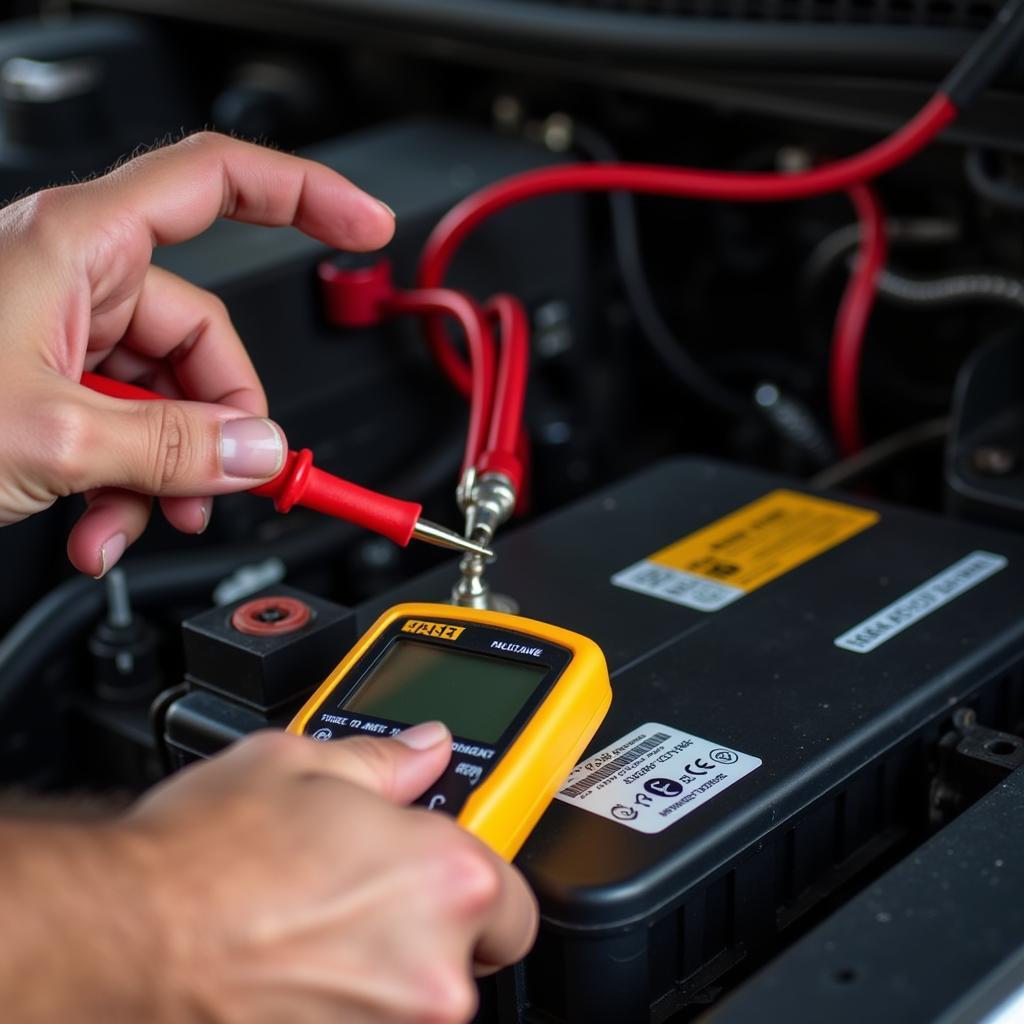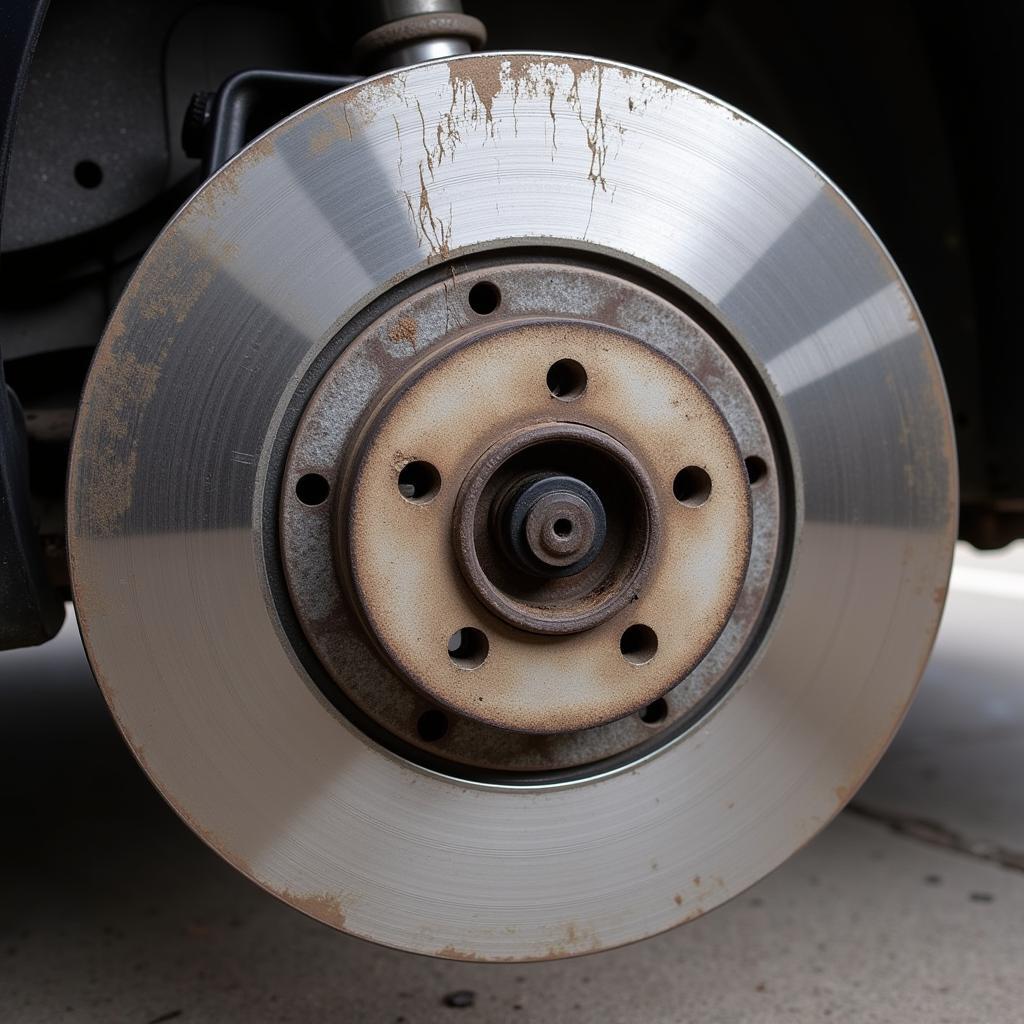Car battery failure can leave you stranded. Recognizing the symptoms of car battery failure is crucial to avoid unexpected breakdowns and ensure a smooth driving experience. This guide provides a comprehensive overview of the common signs of a failing car battery, enabling you to take timely action and maintain your vehicle’s reliability. Is your car battery dead or flat? Let’s dive into the details.
Recognizing the Telltale Signs of a Dying Car Battery
A failing car battery often exhibits various symptoms, ranging from subtle hints to outright failure. Understanding these symptoms can save you time, money, and the frustration of being unexpectedly stranded. What are the bad key fob symptoms associated with a failing battery? Here’s a breakdown of the key indicators:
- Slow Engine Crank: One of the earliest and most common symptoms is a slow engine crank. If your engine cranks slowly or struggles to turn over, it could signal a weak battery.
- Dim Headlights: A weak battery may struggle to power your vehicle’s electrical systems, resulting in dim headlights, especially at idle.
- Clicking Sound When Starting: If you hear a rapid clicking sound when you turn the key, it’s a strong indication that your battery doesn’t have enough power to engage the starter motor.
- Electrical Malfunctions: A failing battery can cause erratic behavior in various electrical components, such as power windows, radio, and interior lights. These malfunctions can range from intermittent operation to complete failure.
 Dim Headlights Indicate Car Battery Failure
Dim Headlights Indicate Car Battery Failure
What Causes a Car Battery to Fail?
Several factors can contribute to car battery failure, including extreme temperatures, old age, corrosion, parasitic drain, and overcharging. Understanding these factors can help you prolong your battery’s lifespan. If you’re experiencing dodge journey battery problems, these factors could be at play.
- Extreme Temperatures: Both hot and cold weather can significantly impact battery performance. High temperatures can accelerate the chemical reactions within the battery, leading to faster degradation. Conversely, cold temperatures can reduce the battery’s ability to deliver power.
- Old Age: Like any other component, car batteries have a limited lifespan. Over time, the chemical reactions within the battery become less efficient, leading to a gradual decline in performance. My battery is dying could very well be due to old age.
How to Test Your Car Battery
Testing your car battery is a straightforward process that can help you identify potential problems before they escalate. You can use a multimeter to measure the battery’s voltage or have it tested at a local auto parts store. The effects of a weak car battery can be quite disruptive, hence the need for regular testing.
- Using a Multimeter: A fully charged battery should have a voltage reading of around 12.6 volts. A reading below 12.4 volts indicates a low charge, while a reading below 12 volts suggests a significant problem.
- Professional Testing: Auto parts stores often offer free battery testing services, which can provide a more accurate assessment of your battery’s health.
“Regular battery testing is a simple yet crucial preventative measure,” says John Miller, a certified automotive technician with over 20 years of experience. “It can help identify potential problems early on and prevent unexpected breakdowns.”
 Mechanic Testing Car Battery with Multimeter
Mechanic Testing Car Battery with Multimeter
Conclusion
Recognizing the symptoms of car battery failure is essential for maintaining your vehicle’s reliability and avoiding inconvenient breakdowns. By understanding the common signs and taking proactive measures, you can ensure a smooth and trouble-free driving experience. Remember to address any signs of car battery failure promptly to avoid potential damage to other vehicle systems. Don’t hesitate to seek professional assistance if you’re unsure about how to diagnose or replace your battery.
FAQ
- How long does a car battery typically last? The average lifespan of a car battery is between three and five years.
- Can I jump-start a completely dead battery? While it’s possible to jump-start a completely dead battery, it’s often a sign of a more serious problem and may require replacement.
- What should I do if my car battery keeps dying? If your car battery keeps dying, it’s essential to have the charging system checked for potential issues.
- Can a bad alternator cause battery problems? Yes, a faulty alternator can prevent the battery from charging properly, leading to premature failure.
- How can I prevent car battery failure? Regular maintenance, such as cleaning the terminals and keeping the battery charged, can help prolong its lifespan.
- What are the signs of a bad starter? Symptoms of a bad starter are similar to those of a bad battery, including a clicking sound, slow engine crank, or no crank at all.
- Is it safe to drive with a weak car battery? Driving with a weak battery can lead to unexpected breakdowns and potentially damage other vehicle systems. It’s best to have it checked and replaced if necessary.


